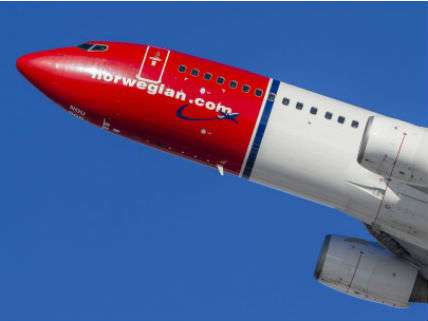Markets at Work: Following Germanwings Crash, Airlines Voluntarily Implement New Safety Precaution
No regulation necessary

Earlier this week, 150 people lost their lives when an aircraft operated by the carrier Germanwings crashed inexplicably into a mountainside. Evidence now suggests the tragedy was not an accident: According to investigators, the co-pilot locked the captain out of the cockpit and then intentionally downed the plane.
In recordings, the locked-out pilot can reportedly be heard trying to force his way back in. He wasn't able to do so because of safeguards put into place after the 9/11 attacks. Cockpit doors on planes today are heavily reinforced, and a pilot inside has the ability to override attempts by someone outside to input an emergency code and gain entrance. Once the flight's captain had exited—presumably to use the restroom—there was nothing he could do to stop the crash.
This adds a ghastly twist to an already horrible event. But several airlines, seeking to soothe passenger fears, are reacting by voluntarily rolling out measures to try to prevent anything like this from happening again. Per a news release from Norwegian Airlines:
Norwegian has been looking into changing its cockpit procedures for a while. However, in light of the tragic Germanwings accident, we are speeding up the process so that two crew members always are present in the cockpit. This means that if one of the pilots leaves the cockpit, one crew member must replace him/her during this time. Our passengers' and crew's safety always comes first, which is why we have decided to change our procedures, in line with US regulations.
Air Canada too is changing its rules to require two people in the cockpit at all times, according to an Associated Press report. U.S. carriers already have such a requirement, but the practice was apparently not common in Europe.
The sad truth is that no system or set of protocols can protect us against every eventuality. From a movie theater in Colorado to a naval vessel docked in Yemen, we've seen time and again that when people are determined enough to cause death and destruction, they will find a way to do it. As Pascal-Emmanuel Gobry wrote today at The Week:
The simple fact of the matter is that not everything can be planned, not everything can be predicted, not everything can be managed. The same cockpit locks that would have prevented 9/11 may have helped cause the Germanwings crash.
The world is simply too complex, and our minds too narrow to quantify everything. … In the end, we humans are really prideful monkeys, who not only don't know much, but are too arrogant to realize it — the worst imaginable combination.
It would be shortsighted to assume that this particular precaution is some sort of silver bullet. But it's comforting to be reminded that faceless megacorporations don't always need to be whipped and chained before they'll want to do right by their customers. The anguish in the statements from Lufthansa, which owns Germanwings, is telling. And no law is forcing Air Canada to implement the two-crew-member policy. The company is taking that step because it cares about its passengers—or, if that's a bridge too far for you, at least about its bottom line.
What's more, trying too hard to micromanage the world around us often makes things worse. Norwegian Air's press release explained that "the new procedures will be implemented as soon as Norwegian has received an approval from the Norwegian Civil Aviation Authority." In other words, it's the need to get permission from a government agency—not greed, and certainly not a lack of humanity—that's standing in the way of this corporation putting better practices into action right away.
